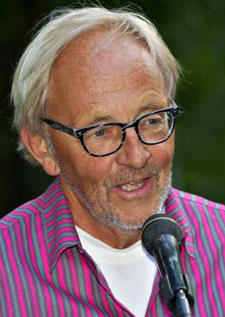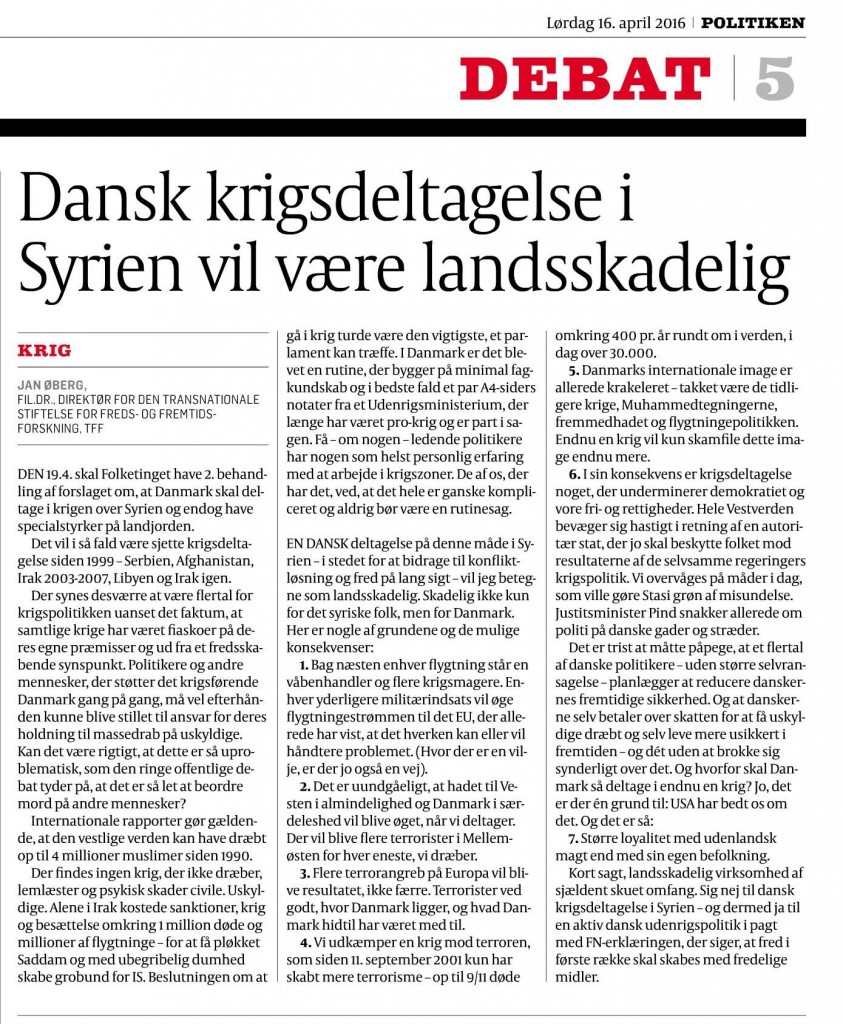Archive for the ‘Terrorism’ Category
“Peace, Conflict, Democracy”
The West leaves, a multi-polar world comes
Jan Øberg Part 1/3
Is ISIS on the wane?
By Jonathan Power
Within a matter of days a self-appointed ISIS “lone wolf”, Omar Mateen, with no actual links to home office Isis has created mayhem in Orlando, Florida, with his killing of 49 people in a gay club, and the Iraq army has pushed Isis troops out of most of the important city of Falluja.
Maybe it is an exaggeration to say that ISIS is on the run its bailiwicks of Iraq and Syria but it is certainly taking very bad hits. Two years after sweeping through northern Iraq and capturing the oil city of Mosul in 2014 they are now on the defensive. ISIS has lost nearly half of the Iraqi territory it held. (i.e. an area about half that of the UK). It has lost much of its oil infrastructure.
It is taking lots of casualties. In Syria it is fighting on two contradictory fronts – the regime in Damascus, supported by Iran and Russia and against the non-Islamist rebels, supported by the US and the Arab states.
Meanwhile the flow of foreign fighters on which it has depended is slowing up and large numbers are returning home. Funding is drying up.
This indeed is why Mateen, the lone wolf, is so important to ISIS. ISIS spokesman, Abu Muhammad al-Adnani, has asked ISIS sympathisers to stay where they are. “The smallest action you do in the heart of [your] land is better and more enduring to us than what you would do if you were with us.”
Is this a switch in tactics? We do not know yet.
What we do know is Read the rest of this entry »
TFF PressInfo # 378: A new Cold War between Russia and the West?
By Jonathan Power
June 7th. 2016.
The second article in the TFF Series on The New Cold War
George Orwell, the author of “Animal Farm” and “1984”, was the first person to use the phrase “Cold War” in a 1945 newspaper article, written just after the nuclear bombing of Hiroshima and Nagasaki. He argued that “the surface of the earth is being parceled off into three great empires, each self-contained and cut off from contact with the outer world, and each ruled, under one disguise or another, by a self-elected oligarchy. He counted the US and Western Europe as one, the Soviet Union as the second and China as the third. He concluded that, “the atomic bomb is likeliest to put an end to large-scale wars at the cost of prolonging indefinitely a peace that is no peace”.
I think he got it nearly right – or so it seems as a new Cold War erupts between the West and Russia and China spars with the US over the South China Sea and its islands.
Of course it’s more complicated than that. China and Russia have a fair relationship. China and the US are perhaps doing nothing much more than annoying each other and the bonds of commerce and student exchanges bind both the elites and the populaces close together.
To me a new Cold War is nonsense on stilts. Even more than the original one.
George Kennan, the US former ambassador to Moscow and the author of how to contain the Soviet Union, always insisted that Stalin had no intention of rolling his tanks into Western Europe. As Robert Legvold summarizes Kennan’s views in his interesting new book, “Cold War”, “The threat the Soviet Union posed was political, a threat accentuated by these countries’ vulnerability to Soviet subversion because of their economic frailty and political instability – a threat requiring a political and economic response, not a military one”.
In 1948 Kennan wrote, as he observed the creation of Nato, “Why did they [Western leaders] wish to divert attention from a thoroughly justified and promising program of economic recovery by emphasizing a danger which did not actually exist but which might be brought into existence by too much discussion of the military balance and by the ostentatious stimulation of military rivalry?” Read the rest of this entry »
Kärnvapen och andra vapen
Av Erni & Ola Friholt
Margot Wallström har utropat en feministisk utrikespolitik för Sverige. Inom den tecknades nyss ett värdlandsavtal med Nato, världens utan jämförelse starkaste militärallians. Avtalet permanentar flera gånger årligen återkommande militärmanövrer i stora delar av vårt lands luftrum, på landytan och i territorialvattnen. Sverige bekostar nödvändiga infrastrukturan-läggningar.
Militärmanövrerna samtrimmar svensk militär med Nato. Den underförstådda motståndaren är Ryssland, ständigt utpekat som aggressivt och hotfullt. Med den förklaringen flyttar Nato ständigt fram sina positioner mot Rysslands gränser. Eftersom Ryssland känner sig hotat utvecklas ett spel som leder till ökad spänning och krigsrisk, vilket i sin tur ger anledning att upprusta båda sidor.
Kapprustningen tar resurser från det civila samhället och skapar oro även där. Närmast ska det torkdrabbade Gotland utrustas med nya anläggningar, vapen och manskap. Kapprustning med ständigt nya vapen har bara ett slut: fattigdom och krig.
I denna situation önskar Sveriges regering förhandla fram ett förbud mot kärnvapen, det vapen som kärnvapenmakternas säkerhetstänkande ytterst vilar på och är det sista de skulle avstå från. Detta erinrar om myten om Sisyfos, mannen som dömts att baxa ett stenblock uppför en sluttning och som varje gång han nått toppen får se blocket rulla ner igen till utgångspunkten.
Den svenska regeringens feministiska Sisyfosarbete bortser ihärdigt ifrån att det är alla de andra vapnen som startar utarmande kapprustning och krigshot. De så kallade konventionella vapnen skördar dagligen och stundligen dödsoffer och skadade. Hur befängt det än kan låta, måste väl illusionen om säkerhet och fred genom de andra vapnen ha lockat till värdlandsavtalet med Nato?
Regeringen väljer att betala och samarbeta med ”de stora grabbarna”, de som i Serbien, Afghanistan, Irak, Libyen, Syrien, Jemen och Somalia med militära konventionella ”insatser” dödat över två miljoner människor på femton år och skadat ännu fler.
Deras svar på konflikter är endast ett: bombningar till underkastelse.
Därför får vi som svar ett evigt s k terrorhot.
Om den feministiska utrikespolitiken vore allvarligt menad, vore den givna politiken nedrustning, samtal och utbyte med den utpekade fienden, allt för avspänning i enlighet med Palmes kommission om gemensam säkerhet, alltså även motsidans säkerhet, och en verklig alliansfrihet.
Nu går färden åt motsatt håll, med kontraproduktiv handelsbojkott och anslutning till Natos våldsdoktrin.
Du lever farligt, Margot!
ERNI & OLA FRIHOLT
TFF PressInfo # 376: North and South Korea: Can be solved if…!
By Johan Galtung
Jeju Peace Forum, Kwangju National University, Seoul; South Korea
Like the Israel-Palestine conflict, the world has gotten tired of it, “what, the two Koreas still unable to sort it out”? Also, like Israel-Palestine, the USA is in it; making the situation complicated.
Never has the situation been so tense after the end of the war in Korea more than 60 years ago. Not only because of the nuclear bomb with missiles in North Korea, and the hawkish pro-nuke reaction in South Korea and Japan, but because of no moves forward to solve the underlying conflict. And where is that conflict? Not between North and South Korea, but between North Korea and USA that after 140+ years of victorious warfare had to accept armistice, not victory, in Korea.
Conflict means incompatible goals. Travel to Pyongyang and find that their goals are peace treaty, normalization of relations, and a nuclear free Korean Peninsula.
And the US goal is the collapse of the present NK regime; failing that, status quo. Given the threat of a major war, even nuclear war, that goal is untenable. Some points.
Why does NK have nuclear capability?
Because NK is threatened by the USA-South Korea alliance in general and their “Team Spirit” in particular to deter conventional, or nuclear attacks; failing that to fight back, and particularly against where the attack might come from: US bases in Okinawa-RyuKyu, and from Japan proper. Militarily trivial.
AND to have a bargaining chip in any denuclearization that of course has to be monitored; given the US cheating in connection with Austrian neutralization in 1955 focused particularly on that one.
AND to show that we are not collapsing, we are capable of making nuclear bombs and the missiles to carry them; far from collapsing. Read the rest of this entry »
TFF PressInfo # 375 Close calls: We were closer to nuclear destruction than we knew (2)
By Gunnar Westberg
The proposition that nuclear weapons can be retained in perpetuity and never used – accidentally or by decision – defies credibility”.
Other serious close calls
In November 1979, a recorded scenario describing a Russian nuclear attack had been entered into the US warning system NORAD. The scenario was perceived as a real full-scale Soviet attack. Nuclear missiles and bombers were readied. After six minutes the mistake became obvious. After this incident new security routines were introduced.
Despite these changed routines, less that one year later the mistake was repeated – this time more persistent and dangerous. Zbigniew Brzezinski, the US national security adviser, was called at three o’clock in the morning by a general on duty. He was informed that 220 Soviet missiles were on their way towards the USA. A moment later a new call came, saying that 2,200 missiles had been launched.
Brzezinski was about to call President Jimmy Carter when the general called for a third time reporting that the alarm had been cancelled.
The mistake was caused by a malfunctioning computer chip. Several similar false alarms have been reported, although they did not reach the national command.
We have no reports from the Soviet Union similar to these computer malfunctions. Maybe the Russians have less trust in their computers, just as Colonel Petrov showed? However, there are many reports on serious accidents in the manufacture and handling of nuclear weapons.
I have received reliable information from senior military officers in the Soviet Union regarding heavy use of alcohol and drugs among the personnel that monitor the warning and control systems, just as in the USA.
The story of the “Norwegian weather rocket” in 1995 is often presented as a particularly dangerous incident. Russians satellites warned of a missile on its way from Norway towards Russia. President Yeltsin was called in the middle of the night; the “nuclear war laptop” was opened; and the president discussed the situation with his staff. The “missile” turned out not to be directed towards Russia.
I see this incident as an indication that when the relations between the nuclear powers are good, then the risk of a misunderstanding is very small. The Russians were not likely to expect an attack at that time.
Indian soldiers fire artillery in northernmost part of Kargil region
Close calls have occurred not only between the two superpowers. India and Pakistan are in a chronic but active conflict regarding Kashmir. At least twice this engagement has threatened to expand into a nuclear war, namely at the Kargil conflict in 1999 and after an attack on the Indian Parliament by Pakistani terrorists in 2001.
Both times, Pakistan readied nuclear weapons for delivery. Pakistan has a doctrine of first use: If Indian military forces transgress over the border to Pakistan, that country intends to use nuclear weapons.
Pakistan does not have a system with a “permissive link”, where a code must be transmitted from the highest authority in order to make a launch of nuclear weapons possible. Military commanders in Pakistan have the technical ability to use nuclear weapons without the approval of the political leaders in the country. India, with much stronger conventional forces, uses the permissive link and has declared a “no first use” principle.
The available extensive reports from both these incidents show that the communication between the political and the military leaders was highly inadequate. Misunderstandings on very important matters occurred to an alarming degree. During both conflicts between India and Pakistan, intervention by US leaders was important in preventing escalation and a nuclear war. Read the rest of this entry »
Mass migration, the EU and European nationalisms
By Johan Galtung
Antwerpen & Alfaz
We are dealing with mass migration, basically into EU, and European nationalisms, many in favor of exits from the EU.
Why this mass migration, maybe to the point of Völkerwanderung, mainly into EU – but then what kind of EU? – and why the European nationalisms now found one way or the other in many member states?
The forecast for migration from Africa into Italy in 2016 is about 100,000; 28,000 already arrived in the first quarter, with 1,000 drowning in the Mediterranean (INYT, 6 May 2016). Big numbers. They knew the risks they were taking, so the push away from Africa and the pull towards Italy, and beyond, must have been considerable.
Better think in terms of 50 million migrants over 50 years, from regions considered uninhabitable to inhabitable regions. There seem to be five major causes underlying this basic world asymmetry:
Slavery, four centuries, depriving societies particularly of able-bodied males, by Arabs, then Westerners, cross-Atlantic transportation mainly by the English (Liverpool);
Colonialism, by Muslims after the death of the prophet in 632, from Casablanca to Southern Philippines, till the end of the 15th century, close to nine centuries, then by Christians close to five centuries, till colonialism was officially ended in the 1960s;
Robbery Capitalism, stealing or paying next to nothing for resources processed into manufactured goods, pocketing the value added;
Wars, mainly initiated by the West, killing millions (the USA more than 20 million in 37 countries after WWII), destroying property;
Ecological Factors, like depletion-pollution, often toxic for humans or nature, erratic climate partly due to climate gases, NOX, CO2, CH4.
These are the causes of poverty in some parts of the world but also of wealth in others; Read the rest of this entry »
Remembering the 1916 Rising
By Mairead Maguire
Nobel Peace Laureate, Co-Founder Peace People, Ireland and TFF Associate
When the President of Ireland, Michael D. Higgins, the Irish Military, Government Members, and many Irish people gathered in Dublin, on Easter Sunday 27th March, 2016 to remember the Easter Rising of l9l6, some of his challenging words were addressed to the young generation.
He encouraged them ‘to imagine and to dream‘ and he said ‘we wish them well as they make music and continue to dream’. The Leaders of l9l6 had political hopes and dreams. President Higgins said ‘For the leaders of l9l6, their political hopes and aspirations for what a free Irish Republic might be, were linked to a rich Irish culture which they cherished and promoted.
Within that vision, their ancient Irish language and culture, informed by our history and migration, was central to everything for which they hoped and fought.’
I believe the men of l9l6 had a democratic right to their dreams of Irish self-determination and to work for Irish Freedom, but the violent method by which they fought for freedom was ethically and morally wrong. Read the rest of this entry »
Danmark skal heller ikke bombe i Syrien – 6 artikler
Af Jan Øberg
Posted on 18 April, 2016 on Jan Oberg’s blog
Den 19. april 2016 havde Folketinget 2. behandling af forslaget om også at bombe og indsætte specialstyrker i Syrien.
Jeg mener at sagen er fundamentalt vigtig for Danmark, danskerne og vor fremtidige rolle og ‘image’ ude i verden.
Desuden finder jeg at beslutningsgrundlaget, mediedækningen og den offentlige debat giver anledning til den største bekymring.
At gå i krig er den vigtigste beslutning en regering kan tage og en befolkning bakke op om. Men det er som om dette at deltage i krig stort set rager både ministre, folketingsmedlemmer, journalister og befolkning en forårsblomst.
Med en vis fortvivlelse skrev jeg derfor 6 artikler med forskellige temaer og producerede en video, der også foreslår hvad vi kunne gøre i stedet.
Jeg ville have disse ting sagt og spredt inden beslutningen blev taget.
Herunder findes de én for én som jeg har skrevet dem med en lille kommentar til publiceringsprocessen, som også i et vist omfang vidner – for mig i hvert fald – om mærkelige prioriteringer hvad angår tidspunkt og længde.
Alt andet lige bliver redaktionerne ikke oversvømmet af kvalificerede, kritiske og konstruktive artikler af denne type – men det er dog kun meget korte ting, man kan få ind. Om overhovedet…
1. Dansk krigsdeltagelse i Syrien vil være landsskadelig
Politiken 16. april 2016. Problemfri publicering.
Den 19. april skal folketinget have 2. behandling af forslaget om at Danmark skal deltage i krigen over Syrien og endog have specialstyrker på landjorden.
Det vil i så fald være sjette krigsdeltagelse siden 1999 – Serbien, Afghanistan, Irak 2003-2007, Libyen, Irak igen.
Der synes desværre at være flertal for krigspolitikken uanset det faktum at samtlige krige har været fiaskoer på deres egne præmisser og ud fra et fredsskabende synspunkt.
Politikere og andre mennesker, der støtter det krigsførende Danmark gang på gang, må vel efterhånden kunne blive stillet til ansvar for deres holdning til massedrab på uskyldige. Kan det være rigtigt at dette er så uproblematisk som den ringe offentlige debat tyder på at det er så let at beordre mord på andre mennesker?
Internationale rapporter gør gældende at den vestlige verden kan have dræbt op til 4 millioner muslimer siden 1990. Read the rest of this entry »
TFF PressInfo # 369 – A Sunni-Salafist-Zionist Coalition Changing Middle East?
By Jan Oberg
Please try Google “Gulf states want nuclear weapons against Iran – Israel “ and only one Western mainstream media will appear, an excellent article by The Telegraph’s Raf Sanchez in Jerusalem.
The only other media carrying the story is Russia Today and Vigilant Citizen and MintPress News also carries the story and offers a wider background
What is this about?A new coalition?
So the usual Western media filter, meaning it must be interesting. And it is a quite sensational story: Saudi Arabia and Israel are up to a nuclear mischief against a country that has just been prevented from acquiring nuclear weapons by means of a huge legally binding document, UN Security Council endorsement and extremely tight monitoring mechanism. What’s it about?
It’s about Israel’s defence minister Moshe Ya’alon saying in public at the recent Munich conference that Arab states are “not willing to sit quietly with Iran on the brink of a nuclear bomb”.
He thinks that Iran was liable to break the agreement as their economic situation improves with the lifting of international sanctions. Ya’alon is quoted as saying that “I speak about the Gulf states and North African states too…For them, Iran and the Muslim Brotherhood are the enemy. Iran is the bad guy for us and for the Sunni regimes. They are not shaking hands [with Israelis] in public, but we meet in closed rooms.”
So not only Jordan’s monarchy and Egypt’s dictatorship but also Gulf and North African states: A coalition lead by Saudi Arabia and Israel – Israel as the only nuclear weapons power in the region and Saudi Arabia as the most likely next nuclear weapons state.
For much too long the world’s attention has been on Iran’s imagined nuclear weapons, not on the dozens or hundreds real nukes that Israel possesses as a non-member of which is the Non-Proliferation Treaty (NPT).
One can say that Israel and Saudi Arabia lost the political battle against the nuclear deal with Iran concluded with the five permanent UNSC members and Germany last year – and now will do their utmost to use Iran’s non-nuclear weapons status as a pretext for others going nuclear against, predominantly, Iran.
Propaganda hysteria dominates in an age where knowledge plays a diminishing role
The problem for them, however, is that Iran will be difficult to sell as a real threat – but we live of course in Read the rest of this entry »







